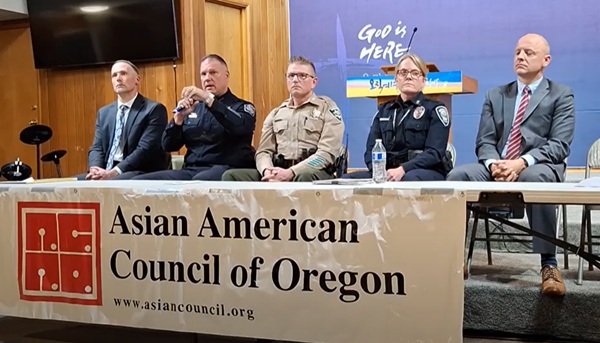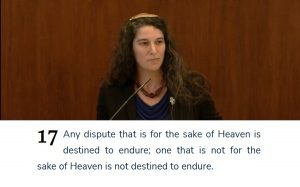Officials enlist neighbors in battle with high-tech burglary ring
12 min read
Presenter: Eugene Springfield residents learned Thursday night about a criminal enterprise that’s built on surveillance, Wi-Fi jamming devices, and burglary crews posing as delivery drivers. After 22 reported burglaries of demographically-targeted homes, a question for Eugene Police Chief Chris Skinner. Oct. 23, public safety forum moderator Jensina Hawkins:
Jensina Hawkins: Chief Skinner, please describe the investigative process that led to the apprehension of seven suspects on Oct. 9.
Chris Skinner (Eugene Police Department, chief): Thank you for the question. So we affectionately refer to this as our ‘Skyline Seven’ that were arrested most recently, you know, and investigators were working really, really hard to try to identify pieces of information that we could track down to help us focus on whether or not (A) the suspects were still in our community, and (B) if they were in our community, where were they?
This particular group, part of the strategy is that before they commit burglaries, they have a jamming device that jams Wi-Fi, which then oftentimes shuts down surveillance video that’s happening in your house. How many people have surveillance video that’s anchored to their Wi-Fi? Most of us do. In one particular case, we had a piece of video, a very granular piece of video with a vehicle that we thought was a suspect vehicle.
[00:01:23] At that particular moment—it was a Wednesday afternoon, I was on a Council meeting in a work session talking about the values of ALPR (automated license plate reader) technology when we got our first hit on the vehicle we were looking for. And how we leveraged the technology is, we didn’t have a plate. We had a really good description of the car.
[00:01:42] We were able to put the description in the car into the ALPR technology, and the ALPR technology started giving us options for that vehicle, and we were able to identify the suspect vehicle with a California plate after vetting a couple of vehicles that were similar in nature. But we found the perfect match, we found the suspect vehicle with the plate. Once we had the plate, the ALPR technology was just invaluable.
[00:02:06] I’m sitting in the Council meeting, we get our first hit on ALPR, and I, honestly, if I could have you see what happened next: An entire detective division who was watching the Council presentation, to include our Special Investigation Unit, goes running out of the office hitting their cars.
[00:02:26] We had almost immediately 15 to 20 police officers scouring the areas looking for the car. Long story short, we were able to vector in on an area that we thought the vehicle was at.
[00:02:37] All of our patrol staff was looking, driving up and down streets, looking for this vehicle. Found the vehicle at a residence. Recognized that the residence was an Airbnb. We quickly pulled back and started our surveillance. Did our surveillance.
[00:02:50] I’m not going to talk about a specific tactic we used, but we started our surveillance and we were able to: follow that vehicle up through the communities of Corvallis, Albany, Salem; sat down the street while they committed a burglary in Salem; alerted Salem PD to that, so that’s solved for them; followed them back to Eugene.
[00:03:10] And what we were trying to find out is with the stolen equipment, were they dropping it somewhere else other than the house they were staying at? So, a stash house or a safe house. We were able to write search warrants as a result of all of that information and ultimately serve those search warrants, and we were able to make those seven arrests.
[00:03:25] But it was from the moment, from noon on Wednesday of that day, for the next 36 hours, the EPD detectives worked every single hour for this 36 hours until we served that search warrant on those individuals and were able to arrest those seven individuals.
[00:03:38] And what is so disheartening is, as we now know, it’s just one wave of many, and unfortunately maybe future waves that we have to try and pay attention to. But in that particular case, the turning point for us was identifying the vehicle and identifying a location to the vehicle.
[00:03:55] Presenter: Speaking later during the public safety forum Oct. 23, Eugene Police Chief Chris Skinner:
[00:04:01] Chris Skinner (Eugene Police Department, chief): This is not a Eugene issue. This is a statewide, this is a national issue. There was a separate group of individuals arrested in Clackamas County just recently. We got alerted from some law enforcement professionals in California that were tracking these individuals up the I-5 corridor. They bypassed Eugene and went up to Portland and did their work up there.
[00:04:19] And so it’s happening, up and down, and this is one of the challenges of being on the I-5 corridor. It’s an easy ingress-egress, it’s easy to duck into our town and victimize our community, and then easily and quickly escape. But we’re seeing this up and down the West Coast. We’re seeing this nationwide.
[00:04:35] It’s rinse and repeat, as far the method of operation. In this particular case, it was pizza delivery ruse to do the surveillance. It’s not always a pizza delivery, but it’s oftentimes delivery of something that they’re showing up as. So those are the types of pieces of information we get. The jamming of the signals we got, we found that out in the July of ’24.
[00:05:04] We saw it again on the Skyline Seven. We followed ’em all over Corvallis and Albany and up to Salem—same stuff. Same things happened up there. So while I can’t talk about the details of the case, because we certainly don’t want to do that, what I can say is that we’re gathering intelligence.
[00:05:18] We’re getting better and better at this. And with the right tools, we can do this. You’ve heard me say that a few times. I’m trying not to get too political here, but with the right tools, we’re able to be able to apprehend people a whole lot quicker than we have in the past.
[00:05:31] I honestly believe that this personally is a very organized ring of individuals, well financed, that are coming together. It’s somewhere in our country—I have a sense of where that is, I’m not sure I should share that, but I have a sense of where that is—and then being sent out into our communities all over the country to perpetrate these crimes. I honestly believe there’s a chance that this is a separate business model for a cartel type of organization.
[00:05:57] Presenter: Lane County District Attorney Christopher Parosa:
[00:06:00] Christopher Parosa (Lane County, district attorney): This is a well-funded, highly organized crime syndicate that we are dealing with. These people can get their hands on—if you set the bail as the Skyline Seven—they all had bail set at $100,000. Well, guess what? Their organization, or I’m assuming their organization, was able to provide $10,000—10% of the bail set—to achieve their release.
[00:06:27] And the frustration from my perspective, as we saw in cases involving prior AAPI burglary individuals, was that they immediately flee our state once released, and often will make their way back to wherever they’re from. And getting us through the process of extradition (if we catch them), can be a challenge as well, as we saw in those original cases from July of 2024.
[00:06:55] So we need to have a mechanism by which we can better assess whether or not a person is either a risk to the community or is a serious risk of flight, which these folks all are. And in those cases, we have to have an ability, a stronger mechanism to potentially hold those people so that we can hold them accountable for the crimes they’re committing to our community members here in Lane County.
[00:07:21] Presenter: Lane County Sheriff Carl Wilkerson:
[00:07:23] Carl Wilkerson (Lane County, sheriff): I have a team of folks who investigate organized crime. And their cartels are in Lane County and they’re not just your traditional Central American cartels. There’s a variety of them, but organized crime, it is in our community.
What I’ve seen mostly is they come, they do their business, they leave, but you know, anything can lead to anything else if we are not paying attention.
[00:07:49] I want to give a pat on the back to Chief Skinner and his crew. I don’t know if everybody recognizes the amount of police work that was done and the incredible police work that was done. And I, as a sheriff, I’m extremely proud of the work they did. So, thank you. (Applause)
[00:08:11] Presenter: Officials believe these crimes are underreported, and urged those targeted to reach out to the local law enforcement agency. Springfield Police Chief Jami Resch:
[00:08:22] Jami Resch (Springfield Police Department, chief): In Portland, I had the wonderful opportunity to serve on their AAPI Council there. And before I came tonight, I reached out to them and they said if there’s anybody in any of our communities down here who would feel more comfortable talking to them first before they reached out to our law enforcement, just to hear their experience about working with police, that they are more than welcome.
[00:08:41] And if there’s anybody here tonight who is, would like that opportunity or knows somebody, please contact me after. I’d be happy to make that connection. But again, I think there’s just a lot of unknowns and if we can work to reduce or eliminate some of those unknowns, then if there are things that are happening in Springfield or Lane County that aren’t being reported, hopefully we can hear that, because one of the things that I want to really stress tonight is the importance of knowing all of the information. Chief Skinner talked about how important and how detailed and how long these investigations can take.
[00:09:13] And I explain it like this: It’s like writing a book. The police departments have to write a book, DA Parosa, DAs have to tell that story. And if we don’t have every page of the book, it’s very difficult to tell that story in court that ends in a successful prosecution. So that’s why I really stress knowing everything that’s going on in our communities and finding ways that we can do that.
[00:09:35] So, when a burglary or something happens in a neighborhood, I have officers and detectives who will go out and canvass. And a lot of times people aren’t home or they’re asleep and they don’t answer their doors. We leave a lot of cards. We do not get a lot of calls. So if a detective or an officer leaves a card on your door, please call us back and inquire. You may not know that your neighbor’s house was broken into, but you may have evidence that’s critical to us.
[00:09:59] Presenter: The forum included questions from the audience. Here’s one from Brenda:
[00:10:03] Brenda: What can we as citizens do to help protect ourselves, our communities, and to help you?
[00:10:11] Presenter: Lane County Sheriff Carl Wilkerson:
[00:10:14] Carl Wilkerson (Lane County, sheriff): Probably the best thing that we can do is be really good neighbors. I mean, we have gotten into a society where we don’t know our neighbors, we don’t talk to our neighbors, we don’t pay attention to the coming and goings of our neighbors. I mean, neighbors first is probably going to be the best thing.
[00:10:28] And then being good witnesses, providing information when we’re investigating, being unsuspicious when we’re asking about your Ring cameras or your various things that can help us prove cases.
[00:10:43] Presenter: Here is a question from Marvy:
[00:10:45] Marvy Schuman: Hi, I’m Marvy Schuman. What could we do as neighbors, you know, aside from the fact that we’ve sort of formed a little Neighborhood Watch among the neighbors around us, but what can we do to battle this jamming of the Wi-Fi? I mean, how can we help ourselves be more secure and unafraid with things like this?
[00:11:09] Presenter: Chief Skinner:
[00:11:10] Chris Skinner (Eugene Police Department, chief): We as a community, for instance, the case that we made on the Skyline Seven, the video that we got was not the victim’s video. It was a neighboring video that we were able to get. And so, as much as we can have a really good community conversation about surveillance, surveillance is happening everywhere. And in many, many cases, your neighbor’s surveillance is going to help you out.
[00:11:30] And so, coming together as a community, being aware of what’s going on in your neighborhood and calling us when you see something suspicious and not waiting. If there’s a gut feeling that that’s not right, then call us, even if we can’t respond, because we’re busy. If we can get that piece of information: ‘Hey, there’s a gray van sitting down the street that just looks like it. It just is out of place. And there’s somebody sitting in that. And I saw three or four males walking to the van and walking away.’
[00:11:58] I mean, we had this most recent burglary that we had, our best witness that we had, and we had to go find this witness, our best witness watched four individuals walk away from our burglary with a sawzall in their hand—for those of you that don’t know what a sawzall is, it’s a cutting tool—and a stepladder, and guess what? It was a second-story entry. And they ended up cutting out parts of the walls looking for where cash might have been stored.
[00:12:24] That was in broad daylight. And we had to go find this witness to be able to tell us that.
[00:12:29] So in many cases, the piece of information that we need is held within your community, within your neighborhood, and that will be really, really important. And then from there, quite honestly, we need to just be turned loose with all the tools that we can have at our disposal to be able to chase down the perpetrators of this crime and be able to do that.
[00:12:46] Presenter: Law enforcement officials believe an organized crime syndicate is hiring teams to burglarize local homes, and say the Flock camera AI surveillance system helped them apprehend the seven suspects they’ve dubbed ‘The Skyline Seven.’ We asked the forum moderators: Did those arrests give you a more positive impression of the Flock cameras? Jensina Hawkins:
[00:13:09] Jensina Hawkins (Oct. 21, 2025): The statement that I’ve been making is that I am grateful that the technology was used to assist in the apprehension of the criminals. As the former chair of the Police Commission, I had a quite literally a front-row seat to the first wave of public comments regarding the Flock cameras.
[00:13:25] And so I have been very sensitive and empathetic to the concerns that have been raised by community members, and I appreciate that the city councils of Eugene and Springfield are taking a break to pause, and think about it thoughtfully, and make a very educated decision on whether or not to continue using the Flock surveillance.
[00:13:49] Presenter: Jenny Jonak:
[00:13:50] Jenny Jonak: Yeah, and I guess I would add, I understand the fears and concerns. I think a lot of us are living in a time period where we’re seeing things that we didn’t ever expect to see, and so worrying about how things might be used or misused in this time of uncertainty, I think is very legitimate. And I understand the desire to make sure there are guardrails or question whether it’s the safest thing at the current moment to have that kind of data out there. So I get that.
[00:14:21] I guess for me, my larger question also is: If our prevention and detention systems are such that we’re not able to hold people that are apprehended for this, and we’re not able to have accountability, is the additional data going to give us some measurable benefit that outweighs the costs to the community members that perhaps already feel a lot of concern under the current administration?
[00:14:49] Presenter: Law enforcement officials see an important role for neighbors and neighborhoods, as they share the latest information about a sophisticated burglary ring at a public forum Thursday night.






